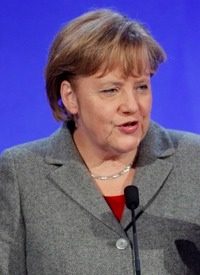
Cracks in Germany’s economy were noted by Professor Wilhelm Hankel of Frankfurt University back in November of 2010: “Germany cannot keep paying for bail-outs without going bankrupt itself. This is frightening people.” He added,
You cannot find a bank safe deposit box in Germany because every single one has already been taken and stuffed with gold and silver. It is like an underground Switzerland within our borders. People have terrible memories of 1948 and 1923 when they lost their savings.
Additional cracks in Germany’s economy were revealed in August this year in the Washington Post, which noted that Germany’s exports in June dropped precipitously from May, and an index of German manufacturing activity dropped to the lowest level since October of 2009. An analyst for Moody’s Analytics, Tu Packard, said, "The fact that [Germany’s economy is] showing signs of faltering and sources of domestic demand aren’t manifesting themselves — the people are worried."
A large part of the problem with Germany’s economy is China. As China’s economy continues to slow, so do Germany’s growth prospects, as a large part of its economy is dependent upon exports to China and other Asian countries. Another part is the lending by Germany’s banks to weaker nations in the eurozone. Says Packard, “German banks have been lending heavily to at-risk countries. If you let other parts of the eurozone go down the tubes, you do down the tubes as well.”
But Germany’s vaunted austerity and alleged restraint on spending are just a chimera, according to Speigel: “In reality, German government finances are not nearly in as good shape as the chancellor and the finance minister would have us believe … government debt as a percentage of GDP is already at more than 80 percent [and] even ailing countries like Spain are in better shape.” The claim by the German duo that deficits are declining reflects reduced spending by local and state governments, not by the national government. In fact, the German government is planning to increase its borrowing next year, to help fund a series of new government spending programs.
Transportation Minister Peter Ramsauer was expecting to have to cut his budget next year in response to charges that he mishandled this year’s allocation. Instead, he is getting an extra $1.4 billion. Another $2 billion in new money is funding a child-care subsidy, and federal government workers can expect their full Christmas bonus this year, costing another $650 million. And long-term-care insurance is scheduled to be subsidized with an additional $1.5 billion. Merkel and Schauble are overseeing additional funding for the ministry in charge of culture and the media, which was expected to see a reduction next year.
Another clock that is ticking is the requirement under the Treaty on European Union that Germany bring down its debt-to-GDP ratio to 60 percent. Of course, the only way that can happen is if the government can run surpluses, not deficits. The earliest that Germany is expected to run a surplus is 2013 and that is based upon favorable assumptions about economic growth. Much more than that is needed, according to Thorstein Polleit, chief economist at Barclays Capital. It would take surpluses, starting immediately, of at least 2.7 percent to bring that ratio into compliance in 10 years. To do it in five years would require surpluses approaching five percent annually.
None of that is likely to happen. The reality is that the signs of a coming recession are visible and growing. In fact, if the recession hits Germany soon enough it could derail Merkel’s determined plans to install the European Stability Mechanism (ESM), the final step in the Insiders’ plans for a dictatorship of Europe. With banks becoming insolvent and the economy in decline, there would be little enthusiasm to join together more tightly with other countries in even worse shape.
The ESM must be voted on by December 31, 2012. The German recession may well thwart that effort and delay, perhaps permanently, the forced political integration of the European Union.
Photo of Angela Merkel: AP Images


